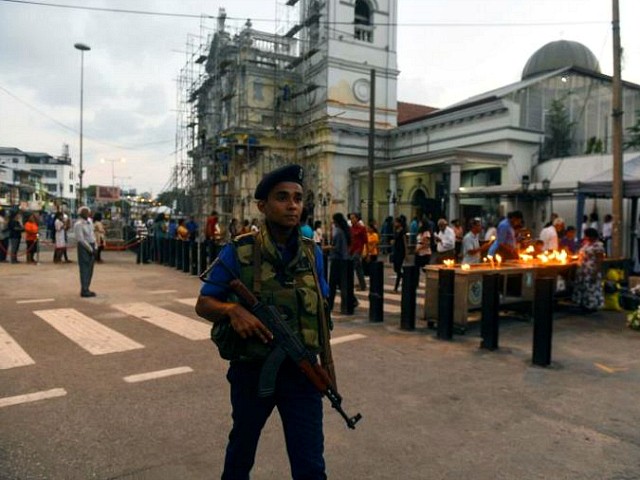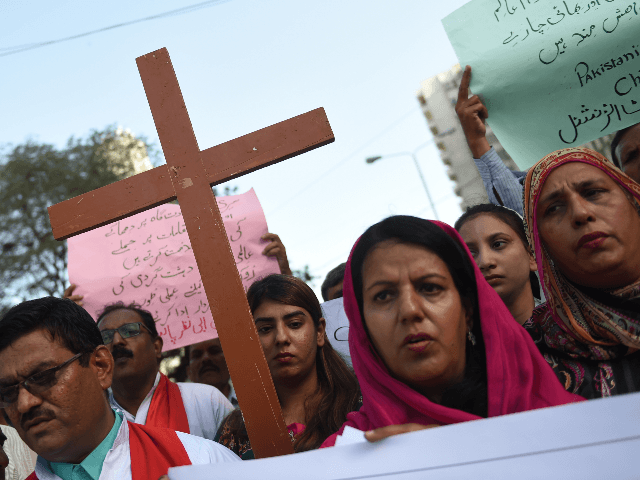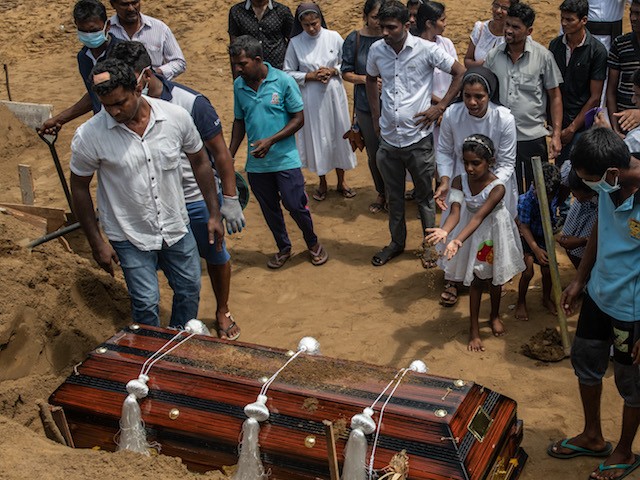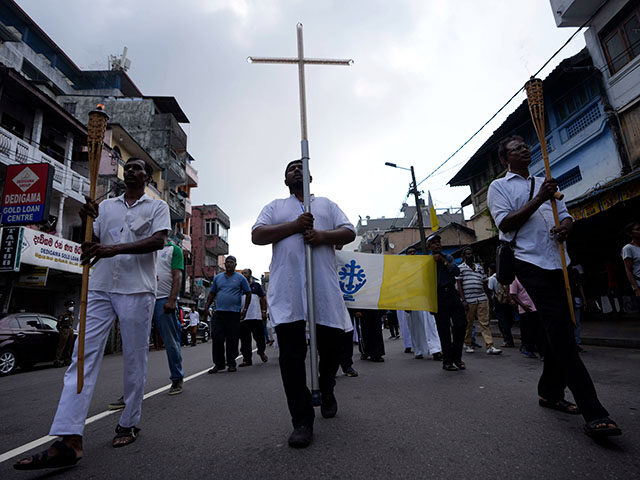Sri Lanka will mark its fifth Easter since the harrowing April 21, 2019, jihadist suicide bombings that killed 275 people and injured dozens of others, deliberately targeting crowded churches and popular hotel brunch spots.
The country’s leaders are still addressing the trauma left by the Islamic State-claimed attack on Sri Lanka’s sizable Christian community, promising heightened security this week including body checks on attendees at some of the country’s largest Easter Sunday Masses.

A child looks at a grave after the funeral in Katuwapity village on April 23, 2019, in Negambo, Sri Lanka, after coordinated attack on churches and hotels on Easter Sunday rocked three churches and three luxury hotels in and around Colombo as well as at Batticaloa in Sri Lanka. (Atul Loke/Getty Images)
During a press conference on Tuesday, the national police force announced a “special security plan” to protect churches consisting of constant communication with priests and other Christian leaders and full inspections of the nation’s largest searches before services on Good Friday and Easter Sunday.
“Under this security plan, the church premises would be inspected before the commencement of the sermons in a manner that does not disturb the devotees,” the Sri Lankan news outlet Ada Derana reported. “Further, if it is deemed necessary to conduct body searches before allowing the devotees to enter the church premises, the police officers are instructed to make necessary preparations after discussing with the priests and boards of trustees of respective churches.”
Sri Lanka’s Catholic Bishops Conference issued a statement on Thursday recognizing the five-year anniversary of the massacre, demanding changes to the government generally and justice for the victims.
“It has been five years since the Easter Sunday mayhem where more than 275 people were killed and scores became patients. We request the authorities to be close to the hearts of these suffering people and mete out justice to them,” the statement read in part.
“Easter is being celebrated at a time when the country is facing a severe social, political and economical crisis. It is essential to bring in a major change to the country’s governing system to ease the people’s suffering,” the bishops continued. “It is the responsibility of all citizens to work towards bringing this change.”

A Sri Lankan Navy personnel stands guard as Catholic devotees pray at St Anthony’s church after it was partially opened for the first time on May 7, 2019, since the Easter Sunday attacks in Colombo. (ISHARA S. KODIKARA/AFP/Getty Images)
Suicide bombers detonated explosive vests at six locations, all churches or hotels hosting Easter brunches, on Easter 2019. Eyewitnesses described the bombers detonating at the back of the churches, where parents of young children were more likely to experience the Mass standing close to the door, allowing for a rapid departure if their child became unruly or needed to eat. The damage to the bodies of the victims was so significant that Sri Lankan authorities initially counted the death toll to be nearly 360 people, but revised it down as they began to identify multiple body parts belonging to the same people.
“I couldn’t bear to watch burning babies and children. But everyone rushed in to help. This is a brutal strike,” one eyewitness identified as “Hamza” told Sri Lanka’s Daily Mirror.
The Islamic State’s Amaq “news agency” took credit for the attack and published photos of the alleged attackers. Sri Lankan authorities identified the culprits, however, as belonging to a local group called “National Thowheed Jama’ath,” which it disbanded, and named the mastermind and head recruiter as radical imam Mohammed Zahran Hashim.
NEW – #ISIS's Amaq releases a new image, showing the 7 perpetrators of the #SriLankaAttacks, with Zahran Hashim (previously ID'd) the only one whose face is uncovered. pic.twitter.com/uLdVDSUcXw
— Charles Lister (@Charles_Lister) April 23, 2019
Sri Lanka is a majority Buddhist country with significant Muslim and Christian minorities. Most Christians in the country are Catholic, hence the targeting of Sunday Mass. The Buddhist majority, in government and religious leadership, responded to the attack with outrage and violence against Muslims. Angry mobs targeted Muslim businesses and Buddhist monks called for the stoning of Muslims after rumors spread among the Buddhists that Muslim restaurants were making food intended to sterilize non-Muslims. The government launched a mass deportation program and banned Islamic garb, such as the hijab, in public.

Pakistani Christians hold placards and cross during a protest in Karachi on April 27, 2019, against the suicide bomb attacks in Sri Lanka. (RIZWAN TABASSUM/AFP/Getty Images)
The government of then-President Maithripala Sirisena was in a state of extreme turmoil at the time of the attacks, fueled by a power struggle between Sirisena, allied with former President Mahinda Rajapaksa, and then-Prime Minister Ranil Wickremesinghe. Distracted by their disputes, the head of Sri Lanka’s State Intelligence Service (SIS) Sisira Mendis told the Sri Lankan Parliament in May 2019 that the government was notified of an imminent jihadist attack shortly before the bombings and did nothing about them. The inaction was partially attributed to various sectors of the Sri Lankan defense apparatus being under the auspices of Sirisena or Wickremesinghe, but not both, and thus failing to communicate the warnings with each other.
Sirisena vacated the presidency shortly thereafter, succeeded by Mahinda’s brother Gotabaya Rajapaksa. Gotabaya Rajapaksa was forced to flee the country in July 2022 after his poor management of the country led to massive, violent mob protests that culminated with a mob storming the presidential residence and throwing a party in the president’s private pool.
Video footage circulating on social media shows protestors bathing at President’s House. pic.twitter.com/cMfoYV6VXu
— DailyMirror (@Dailymirror_SL) July 9, 2022
Ranil Wickremesinghe emerged as president as Sri Lanka, but not before rioters set his house on fire.
#WATCH | Sri Lanka: Amid massive unrest in the country, protestors set ablaze the private residence of Sri Lankan PM Ranil Wickremesinghe#SriLankaCrisis pic.twitter.com/BDkyScWpui
— ANI (@ANI) July 9, 2022
Sirisena had largely remained out of the public eye since he stepped down from the presidency. He abruptly returned to new headlines on March 22, when he claimed that he knew who was “behind” the Easter 2019 bombings, but that he would only tell a court if it was kept “confidential.” Given that the Islamic State took credit for the attack and the name and photo of the alleged mastermind were available shortly after the attack, it is unclear exactly who Sirisena wishes to implicate.

A little girl throws earth on a coffin during the funeral of a person killed in the Easter Sunday attack on St Sebastian’s Church, on April 24, 2019 in Negombo, Sri Lanka. (Carl Court/Getty Images)
Sirisena also claimed that he only came about the information of the “real” orchestrators of the attack less than a month ago, without elaborating.
“If the Court summoned me, I’ll appear and testify under the confidential agreement. The reason for this arrangement is that I fear the safety of not only myself and my children but also other family members if I were to testify in an open court,” Sirisena said.
“He should be arrested immediately,” local priest Father Rohan Silva denounced this week, responding to Sirisena’s announcement. “If an ordinary person had made such a serious statement, they would have been arrested and interrogated by the police already.”
The Ministry of Public Security has reportedly launched an investigation into Sirisena.

COMMENTS
Please let us know if you're having issues with commenting.